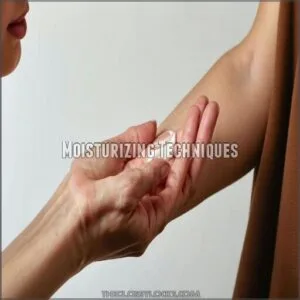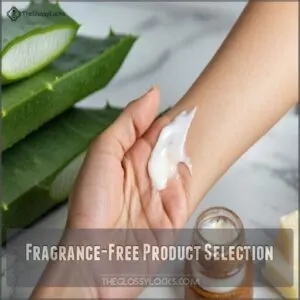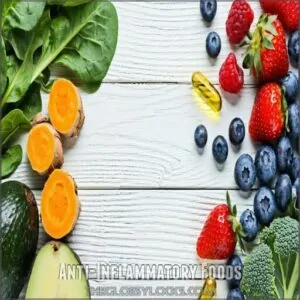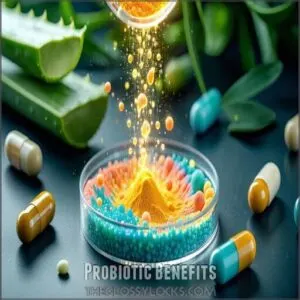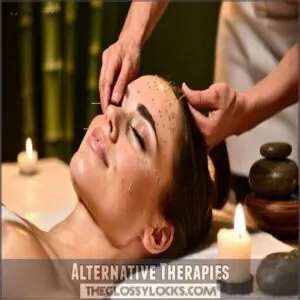This site is supported by our readers. We may earn a commission, at no cost to you, if you purchase through links.

Coconut oil hydrates and locks in moisture, while aloe vera soothes redness and itchiness—a lifesaver after a rough day.
Oatmeal baths? They calm irritated skin like magic and create a barrier to protect against dryness.
For stubborn itch, diluted apple cider vinegar can balance your skin’s pH, but don’t overdo it—your skin’s not a salad!
Stick to fragrance-free moisturizers and avoid hot showers, which can strip your skin.
Managing eczema takes care, but gentle, natural remedies might just help your skin breathe a little easier, and keep you curious to keep exploring and find what works best for your skin to breathe a little easier.
Table Of Contents
- Key Takeaways
- Natural Eczema Remedies
- Eczema Skincare Routine
- Dietary Approaches
- Alternative Therapies
- Eczema Management Tips
- Frequently Asked Questions (FAQs)
- What is the best natural way to treat eczema?
- What is a good skincare routine for eczema?
- What is the 3 minute rule for eczema?
- What do the Chinese do for eczema?
- How does environmental pollution affect eczema severity?
- Can natural remedies replace prescription eczema treatments?
- Are certain fabrics better for eczema-prone skin?
- What role does sleep quality play in eczema?
- Is sweat a trigger for eczema flare-ups?
- Conclusion
Key Takeaways
- Use coconut oil and aloe vera to soothe inflammation and lock in moisture after bathing.
- Take oatmeal baths and apply diluted apple cider vinegar to calm itchy, irritated skin.
- Moisturize within three minutes of washing, stick to fragrance-free products, and avoid hot showers.
- Add omega-3s to your diet to support skin health.
Natural Eczema Remedies
You don’t need harsh chemicals to manage eczema when natural remedies can offer soothing relief.
Options like coconut oil, sunflower seed oil, and aloe vera are backed by evidence for their ability to moisturize your skin and support its natural barrier.
Coconut Oil Benefits
Coconut oil is a powerhouse in eczema natural remedies. Its antibacterial properties and ability to reduce inflammation make it a trusted choice for eczema relief.
A true powerhouse for eczema relief, coconut oil soothes inflammation, fights bacteria, and supports your skin’s natural barrier seamlessly.
Plus, it’s perfect for skin barrier repair and hydration. Coconut oil’s benefits include inhibiting melanin production, potentially lightening skin over time.
Want to give it a try?
- Gently apply as a moisturizer after bathing.
- Use virgin or cold-pressed for purity.
- Avoid overuse to prevent greasy skin.
Sunflower Seed Oil Uses
Sunflower seed oil is a star in skincare for eczema, offering moisturizing properties and supporting skin barrier repair.
It gently reduces itch and is safe for infants, making it a trusted eczema relief option. Many users find relief from eczema with consistent use.
For best results, apply after bathing.
| Benefit | Effect | Suitable For |
|---|---|---|
| Skin barrier repair | Enhances skin protection | All ages |
| Itch reduction | Soothes discomfort | Sensitive skin |
| Moisturizing properties | Locks in hydration | Daily use |
| Safe application | Non-irritating formula | Babies & adults |
Aloe Vera Gel Applications
Aloe vera gel is a natural eczema treatment loved for its soothing touch. Its anti-inflammatory effects work wonders on irritated skin.
Aloe vera gel soothes and calms irritated skin while delivering natural anti-inflammatory benefits for lasting eczema relief.
For the best results:
- Apply the gel twice daily for skin hydration.
- Use clean hands to avoid bacteria.
- Look for pure, preservative-free aloe vera.
- Store it cool to enhance freshness.
- Gently massage for calming eczema skin.
Explore aloe vera products for eczema relief.
Apple Cider Vinegar Dilution
Aloe vera isn’t the only multitasker in your natural remedies toolkit.
Apple cider vinegar (ACV) might help calm eczema by soothing inflammation, but dilution is key.
Always mix one part ACV to ten parts water.
Patch-test first to avoid skin irritation, and never apply directly.
While some swear by ACV’s benefits, sensitivity testing guarantees potential risks stay minimal, ensuring a safe use of ACV.
Eczema Skincare Routine
Creating an eczema-friendly skincare routine can make a big difference in managing symptoms and protecting your skin’s barrier.
With the right combination of gentle cleansing, moisturizing, and selecting fragrance-free products, you’ll help soothe irritation and prevent flare-ups.
Gentle Cleansing Methods
When caring for eczema-sensitive skin, cleansing gently is key.
Use lukewarm water and avoid harsh soaps. Opt for soap alternatives with mild, fragrance-free ingredients. Pat dry instead of rubbing to protect your skin barrier.
Remember these tips:
- Stick to gentle soaps designed for eczema skincare routines.
- Avoid irritating ingredients like perfumes or alcohol.
- Cleanse less frequently to prevent dryness.
Moisturizing Techniques
To lock in skin moisture after gentle cleansing, apply an emollient-rich moisturizer within three minutes of bathing. Prioritize humectant usage, like glycerin, and oil application for occlusive barriers.
Daily moisturizing strengthens the eczema skin barrier and enhances hydration. Avoid scented products and stick with dermatologist-recommended formulas. Many individuals find relief using specialized eczema products.
| Step | Action | Benefit | Tips |
|---|---|---|---|
| After Bathing | Use moisturizer on damp skin | Boosts skin hydration | Wait no longer than 3 minutes |
| Choose Moisturizers | Pick emollient-rich formulas | Improves skin barrier | Avoid added fragrances |
| Apply Oils | Lock in moisture | Creates occlusive barrier | Try cold-pressed oils |
| Frequency | Moisturize at least twice daily | Maintains skin moisture | Don’t skip evening applications |
Exfoliation Tips
After moisturizing, gentle exfoliants—like oatmeal or lactic acid—help renew your skin without harming its fragile barrier.
Limit exfoliation frequency to once or twice a week, avoiding scrubs or harsh particles.
Chemical peels are kinder to eczema-sensitive skin than physical exfoliation.
Follow up with hydration to lock in moisture, promoting better skin barrier function and soothing results, which helps with gentle exfoliants and maintains a healthy skin barrier.
Fragrance-Free Product Selection
If exfoliating left you feeling unsure about your product choices, focus on fragrance-free moisturizer and gentle skincare eczema options.
Sensitive skin thrives with minimal ingredients—become a pro at label reading! Prioritize skincare for eczema with natural skincare eczema products.
Ingredient awareness helps avoid irritation; always patch test before committing. Your eczema-sensitive skin will thank you for the extra care!
Many dermatologists recommend ceramide-rich formulas for repairing the skin barrier with gentle care.
Dietary Approaches
What you eat can play a key role in managing eczema, as certain foods may either calm or irritate your skin.
By focusing on anti-inflammatory options like omega-3s and probiotics, you might notice a meaningful difference in your symptoms.
Anti-Inflammatory Foods
A great way to support your skin is through an eczema antiinflammatory diet.
Turmeric benefits, leafy greens, and the antioxidant power of berries can help reduce inflammation linked to flares.
Balance your meals with fish oils for healthier skin, and steer clear of processed foods.
Choosing organic foods supports overall wellness—think of it as feeding your skin from the inside out!
Omega-3 Rich Foods
Adding omega-3-rich foods like fish oil, flax seeds, chia seeds, and walnuts to your eczema diet can ease inflammation.
These eczema anti-inflammatory sources support skin health while helping tackle flare-ups.
Stick to organic foods when possible, avoiding potential food allergies.
Proper omega-3 dosage is simple—small dietary changes, big skin benefits, think of it as feeding your skin happiness, with eczema diet being a crucial aspect.
Probiotic Benefits
Boosting your gut microbiome may support natural eczema treatment.
Probiotics promote immune modulation and aid skin health by reducing inflammation.
Try these probiotic strains for eczema skincare benefits:
- Lactobacillus rhamnosus: Helps balance gut bacteria.
- Bifidobacterium lactis: May reduce skin inflammation.
- L. acidophilus: Supports the skin microbiome.
- Topical probiotics: Improve localized skin issues.
Consider supervised use!
Hydration Importance
Hydration’s key to eczema relief! To protect your moisture barrier, prioritize oil application and humectant usage.
Limit bathing frequency—short, lukewarm baths help retain hydration.
Check out this table for quick tips:
| Tip | Why It Works |
|---|---|
| Use natural moisturizers | Seals in moisture post-bath |
| Apply oils damp | Boosts skin hydration techniques |
| Choose humectants | Attracts water, enhances hydration |
Skin hydration tips make a big difference!
Alternative Therapies
You might be surprised how therapies like acupuncture, hypnosis, or vitamin D supplementation can complement your eczema treatment plan.
These approaches, supported by growing research, offer potential relief by targeting symptoms and improving overall skin health.
They provide a means to achieve potential relief by addressing the condition more holistically.
Acupuncture Benefits
Acupuncture, a centuries-old practice, can work wonders for eczema by promoting nerve modulation and reducing itch.
It also boosts well-being by facilitating itch relief and reducing inflammation.
This holistic approach helps restore balance, offering both pain relief and a calming sense of relaxation.
As an alternative therapy, acupuncture integrates seamlessly with eczema soothing remedies, emphasizing natural, effective itch reduction solutions.
Acupressure Techniques
Acupressure offers gentle relief using targeted pressure techniques. It can ease itchiness, reduce inflammation, and improve your overall well-being by stimulating specific acupressure points.
For eczema soothing remedies, try these approaches:
- Press the inside of your wrist to support itch relief.
- Gently massage the webbing between thumb and index finger for skin inflammation relief.
- Apply light pressure behind the knees to calm sensitive areas.
Hypnosis Therapy
If you’ve ever scratched your way through stress, hypnosis might help.
Eczema hypnosis taps into your subconscious, easing stress and itch control while helping with sleep.
Studies show hypnotherapy benefits like reduced eczema severity and behavioral impact in six sessions.
Imagine your stressed-out skin sighing in relief as your mind takes a calming break!
| Hypnotherapy Benefits | Impact on Eczema |
|---|---|
| Reduced Stress | Less itching and irritation |
| Improved Sleep | Enhanced skin healing |
| Behavioral Awareness | Controlled scratching |
| Ego-Strengthening | Boosted resilience |
| Long-Lasting Effects | Up to 18 months of relief |
Vitamin D Supplementation
If you’re managing eczema, vitamin D can be a game-changer for your skin health.
Here’s how:
- Aim for 1,000-2,000 IU daily; stick to dosage guidelines.
- Watch for deficiency symptoms like dry, itchy skin.
- Embrace sunlight exposure, but avoid overdoing it.
- Include food sources like salmon and egg yolks.
- Opt for reliable supplement types if sunlight isn’t practical.
High sugar intake can lead to collagen breakdown and aging, which affects skin health and may cause aging.
Eczema Management Tips
Managing eczema doesn’t have to feel overwhelming when you focus on small, effective changes.
From reducing stress to using a humidifier, simple strategies can help soothe your skin and prevent flares.
Stress Reduction Methods
Stress makes eczema worse, doesn’t it? Try stress management like mindfulness techniques or breathing exercises to stay calm.
Exercise benefits include curbing itch and reducing tension. Nature therapy soothes the mind, while better sleep hygiene boosts healing.
Cognitive behavioral therapy and habit reversal therapy train you to avoid scratching.
| Tip | How It Helps |
|---|---|
| Mindfulness | Lowers anxiety, reduces itch |
| Breathing Exercises | Eases stress quickly |
| Exercise | Improves mood, supports skin |
| Nature Therapy | Increases relaxation |
| Sleep Hygiene | Speeds up skin recovery |
Humidifier Usage
A humidifier can transform your itchy, dry space into a haven, relieving eczema symptoms.
Choose the right humidifier type, like cool-mist models, and maintain humidity levels between 40-60% to avoid eczema trigger zones.
Water quality matters—use distilled water to prevent mineral buildup.
Regular cleaning frequency is essential to prevent mold.
Smart placement tips? Keep it near, but not too close.
Wet Wrap Applications
Wet wrap applications work wonders for atopic dermatitis and dry, itchy skin.
Start by moisturizing the inflamed area for skin hydration, then wrap it using damp, breathable material like cotton.
Add a dry layer over it for a layering technique that traps moisture, and wear the wraps for the recommended duration.
Regular use reduces skin inflammation but be mindful of infection risk, as moisturizing is key to managing the condition.
Cold Weather Precautions
Cold weather can spark Winter Itch and dry skin, worsening eczema.
Combat this by wearing layered clothing to shield against cold air, and increase your moisturizing frequency—especially after washing.
Don’t forget about humidifier benefits; they help keep indoor air moist and soothing.
Consider using products with ceramides for barrier repair to lock in moisture.
Avoid eczema triggers like rough fabrics and harsh soaps to keep your skin calm and hydrated all season.
Frequently Asked Questions (FAQs)
What is the best natural way to treat eczema?
Picture a thirsty plant soaking up rain—your skin craves that same care.
Use coconut or sunflower seed oil on damp skin to lock in moisture, reduce itch, and improve its natural barrier.
What is a good skincare routine for eczema?
Start with a gentle, fragrance-free cleanser, moisturize daily with a thick, natural cream after bathing, and use lukewarm water.
Avoid harsh products, patch-test oils like coconut, and cover up to prevent irritation.
What is the 3 minute rule for eczema?
The 3-minute rule for eczema means you should apply moisturizer within three minutes of bathing.
It locks in the skin’s moisture before it evaporates, helping to prevent dryness and soothe irritated skin effectively, following the 3-minute rule.
What do the Chinese do for eczema?
In China, eczema treatment often blends traditional Chinese medicine with modern approaches.
Practices like acupuncture, herbal remedies, and dietary adjustments aim to balance the body, while mindfulness techniques help manage stress-related flare-ups.
How does environmental pollution affect eczema severity?
Environmental pollution worsens eczema by increasing skin inflammation, dryness, and sensitivity.
Pollutants like smoke and dust can break your skin barrier, trigger flare-ups, or make treatments less effective.
Managing exposure helps reduce symptoms and irritation, and improve overall skin health by minimizing the impact of pollutants.
Can natural remedies replace prescription eczema treatments?
Natural remedies can complement prescription eczema treatments, but they rarely replace them entirely.
Severe cases often need medical intervention.
Always consult your doctor to guarantee safety, avoid complications, and create a balanced treatment plan, ensuring safety is a priority.
Are certain fabrics better for eczema-prone skin?
Clothes make the man—especially with eczema.
Stick to soft, breathable fabrics like cotton or bamboo.
Avoid wool and synthetics; they can itch or trap sweat, worsening symptoms.
Loose fits also reduce skin irritation and help you stay comfy.
What role does sleep quality play in eczema?
Better sleep helps your skin heal and manage eczema flare-ups.
Poor sleep triggers stress hormones, worsening itching and inflammation.
A solid bedtime routine, comfy sheets, and cool temperatures can make a big difference, with better sleep being key to these improvements.
Is sweat a trigger for eczema flare-ups?
Sweat can be a double-edged sword for eczema—it cools you down but irritates sensitive skin.
Trapped sweat mixes with salt, triggering itchiness and flares.
Stay cool, shower after sweating, and moisturize promptly!
Conclusion
Think of managing eczema like tending to a delicate garden—the right natural skincare remedies for eczema can nurture and protect your skin.
With tools like coconut oil for hydration, aloe vera to calm irritation, or oatmeal baths for soothing relief, your skin can thrive when treated gently.
Pair these remedies with a consistent, fragrance-free skincare routine, a balanced diet, and stress management.
Your skin’s journey to comfort is all about exploring what works best for you, using natural skincare remedies.



